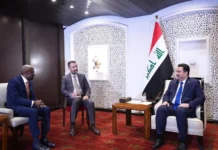CandyKisses: UN: We will not participate in Iraqi-US negotiations
Mawazine News – Baghdad
The spokesman for the UN Secretary-General, Stephane Dujarric, confirmed that the United Nations will not participate in negotiations between Washington and Baghdad on the fate of US and international coalition forces in Iraq.
“It is good for them to negotiate on the subject, but it will not affect the mission of our envoy in Iraq,” the spokesman for the UN Secretary-General said.
He noted that “the United Nations has not shown any support or opposition to the remaining forces in Iraq.
Tensions in Iraq have increased since the Gaza war, and U.S. and coalition forces have been targeted with at least 60 drone and missile attacks by armed groups.
On Thursday, the Ministry of Foreign Affairs announced the success of the negotiations between the Iraqi and American governments, which began in August 2023, in order to formulate a timetable that determines the duration of the presence of the advisers of the international coalition in Iraq, the end of the military mission of the coalition against ISIS, and the transition to comprehensive bilateral relations with the coalition countries, political, economic, cultural, security and military consistent with the vision of the Iraqi government.
The United Nations Assistance Mission for Iraq (UNAMI) has been in Iraq since 2003 to provide humanitarian, development and reconciliation assistance.
************
CandyKisses: Sudani sponsors the launch of the first round of bilateral dialogue to end the mission of the international coalition in Iraq
{Political: Al-Furat News} Prime Minister Mohammed Shia Al-Sudani sponsored today, Saturday, the launch of the first round of bilateral dialogue between Iraq and the United States, to end the mission of the international coalition in Iraq.
The Sudanese media office said in a statement received by {Euphrates News} that “Prime Minister Mohammed Shia Al-Sudani sponsored the launch of the first round of bilateral dialogue between Iraq and the United States of America to end the mission of the international coalition in Iraq.”
Baghdad and Washington agreed on Thursday to launch working groups within the framework of the “Supreme Military Committee”, to study the future of the coalition in light of the “danger” posed by ISIS, and the capabilities of the Iraqi security forces.
The Foreign Ministry said the working groups will “formulate a specific and clear timetable, outlining the duration of the presence of the international coalition’s advisers in Iraq, and directing the deliberate phase-down of its advisers on Iraqi soil.”
In Washington, Deputy Defense Department spokeswoman Sabrina Singh said the size of U.S. military power in Iraq “will certainly be part of the discussions as things progress.”
A Pentagon official said in a press statement that a military committee “will conduct an assessment to reshape the relationship with Baghdad,” noting that “there is no imminent withdrawal of US forces from Iraq.”
Defense Minister Thabet al-Abbasi said on Thursday that his country’s forces “are fully ready to withdraw the coalition forces and hold the security file in the country in full, especially after the experience they have gained in the past years and their dealing with security threats and their elimination.”
He added in a statement, “The timings of the withdrawal of the coalition forces will be determined, and the building of joint cooperation relations between Iraq, the United States and the coalition countries in various political, economic, cultural, security and military fields, in line with the vision of the Iraqi government.”
Prime Minister Mohammed Shia Al-Sudani said recently that “the end of the mission of the international coalition is a necessity for Iraq’s security and stability, and it is also a necessity to maintain constructive bilateral relations between Iraq and the coalition countries.”
Al-Sudani considered that “there is no longer any justification for the existence of the international coalition,” saying: “Today the security situation, with the testimony of all specialists in Iraq, and friends, is that ISIS does not represent a threat to the Iraqi state.”
There are about 2,500 American troops in Iraq, while about 900 American soldiers are deployed in Syria, within the framework of the international coalition launched by Washington in 2014.
************
CandyKisses: Washington’s message to Baghdad: Economic support will fade after withdrawal, no negotiations before attacks stop
Mawazine News – Baghdad
Reliable sources revealed the content of a letter handed over by US authorities to the Iraqi government regarding the arrangements for the withdrawal of the international coalition forces.
The letter included “the method of withdrawal and its timetable,” along with “the obligations on the Iraqi side,” stressing that this withdrawal, if it happens, will not be without a price and “will not stop the deterrent attacks of armed groups loyal to Iran.”
The Iraqi Foreign Ministry said on Wednesday night that an “important letter” had been received from Washington, and that Prime Minister Mohammed Shia’a Al-Sudani would study it carefully.
The sources explained to Asharq Al-Awsat that “Washington does not mind the transition to a new stage of bilateral relations, but the withdrawal of forces (by any way) will not stop the deterrent attacks of the activity of armed groups loyal to Iran, as long as they contribute to destabilizing the security and stability of the region.”\
The Sudanese shared “important aspects” in the American message with leaders in the “Coordination Framework” coalition, including “confirmation that US strikes will not stop against the factions,” according to the sources. “The upcoming technical negotiations to arrange the withdrawal will not be easy and quick, and will take the time necessary to ensure that all files associated with this presence are settled,” the letter hinted.
According to the sources, “Washington encouraged Baghdad during the letter to understand and understand the consequences of the withdrawal, including the financial and economic obligations that bind the two countries.”
Iraq has been depositing its oil revenues in a bank account controlled by the US Treasury Department since 2003, pursuant to UN Security Council Resolution 1483, which was intended to “help Iraq manage its resources in a transparent manner.”
Since the American message arrived at the government offices in Baghdad, political forces have been active in intensive dialogues, trying to understand the appropriate way to deal with “this sudden step.” Three informed sources told Al-Sharq Al-Awsat that “an influential Shiite party within the (coordination framework) is now trying to convince the factions involved in the field escalation against the Americans to retreat a little.”
The Islamic Resistance in Iraq confirmed yesterday, Friday, that the request of the United States of America to the Iraqi government to hold talks to arrange the status of its forces, is “except an attempt to mix the cards, turn the table on the resistance, and gain time, to carry out more crimes and demonic schemes to harm our people and nation.





